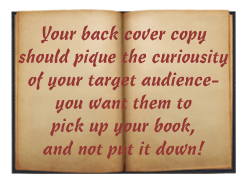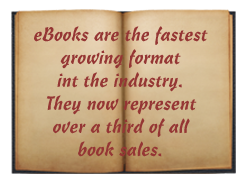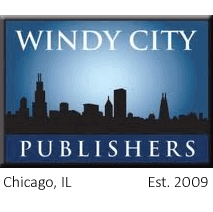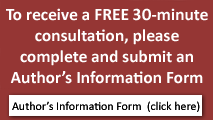Most people claim they are going to write a book—few ever do. Congratulations on achieving your goal. You are one step closer to becoming a published author!
Gathering as much information as you can before making any publishing decisions is a smart way to begin. We understand that you have numerous options available and it can be difficult to know which direction to go when it comes to selecting a publisher.
You can start by asking yourself what you want to achieve with your book. What are your goals—to be a best-seller; to provide your family with a memoir; to just be able to say that you’re a published author? Your goal can help you decide which services you may require. If your goal is to be taken seriously as an author, you will want a professional edit. If you want to sell a lot of books, you may need a marketing or business plan. If you feel your target audiences are digital readers, an eBook is a great option.
Talk with a publishing professional to help get the answers you need to make an informed decision. Once you have defined the ‘big picture,’ it’s easier to see how you can make the most of your resources throughout the process of transforming your manuscript into a viable book.
Editing
Assuming you have a completed manuscript, the most important place to start is in the Editorial Department with a professional edit. A professional editor is one who edits books for a living, an expert in the industry. Your high school English teacher, neighbor, or friend, although very well-meaning, most likely lacks the background or experience of a seasoned editor. Editing is an art form and it can take years of experience for an editor to understand the nuances that are required to have a professionally edited book.
 There are several types and styles of edits. Many writers choose to start with an Editorial Review. This type of edit provides an initial reaction to a manuscript that allows an author to make constructive changes. A Substantive Edit analyzes content for organizational structure, logic, completeness, design, style, and tone. The objective is to make the manuscript functional and impactful for readers. This type of edit generally takes the longest to complete and it the most comprehensive. A Copy Edit checks for consistency and accuracy, as well as proper grammar, syntax, punctuation, spelling, voice, and sentence construction. A Proofread Edit is the final edit before a book is officially published, and checks for any remaining errors that may still exist.
There are several types and styles of edits. Many writers choose to start with an Editorial Review. This type of edit provides an initial reaction to a manuscript that allows an author to make constructive changes. A Substantive Edit analyzes content for organizational structure, logic, completeness, design, style, and tone. The objective is to make the manuscript functional and impactful for readers. This type of edit generally takes the longest to complete and it the most comprehensive. A Copy Edit checks for consistency and accuracy, as well as proper grammar, syntax, punctuation, spelling, voice, and sentence construction. A Proofread Edit is the final edit before a book is officially published, and checks for any remaining errors that may still exist.
If one of your goals is to have your book reviewed or to submit it for awards, a professional edit is a must. Critics, reviewers, and librarians can usually tell immediately if a book has not been professionally edited, as would many readers today. Your sales and credibility will certainly suffer.
Cover Design
 Did you know that you only have about seven seconds to grab a reader’s attention with your book cover? Your cover must quickly convey what your book is about and instantly catch the eye of a potential reader. A great title and a powerful cover should communicate the genre of your book and pique a potential reader’s curiosity and interest. And yes, people do judge a book by its cover.
Did you know that you only have about seven seconds to grab a reader’s attention with your book cover? Your cover must quickly convey what your book is about and instantly catch the eye of a potential reader. A great title and a powerful cover should communicate the genre of your book and pique a potential reader’s curiosity and interest. And yes, people do judge a book by its cover.
Your book cover is made up of three components: the front, the back, and the spine. Each element should be designed with your targeted reader in mind. Your cover, both front and back, is the first selling point of your book, so it’s important that not only the design, but all of the cover copy catches a reader’s interest and makes them want to open up your book and start reading. Always make sure your cover (front, back, and spine) is professionally edited—errors will keep your book on the shelf waiting to be read.
Book Formats and Production
 Today’s digital environment offers authors many different formats to share their books, including paperback, hardcover, and eBook. Your goals and intended target audience will drive which formats you choose for your book.
Today’s digital environment offers authors many different formats to share their books, including paperback, hardcover, and eBook. Your goals and intended target audience will drive which formats you choose for your book.
An ISBN (International Standard Book Number) is your book’s social security number, and every type of format of your book (paperback, hardcover, eBook) needs to have its own separate ISBN if you plan to sell it in the marketplace.
A barcode is also required to sell your book—the black horizontal lines are actually a visual representation of the ISBN and the book’s price. Once your book is complete, it should be registered with the Copyright office. This registration provides the legal documentation that it belongs to you. But this registration is just the documentation of something that already exists—copyright protection starts from the time you put pen to paper. Quite often, authors rush out to copyright their material without realizing that the copyright date time-stamps their manuscripts. So if you copyright your book in 2014, but don’t actually publish it until 2016, it can appear to already be two years old instead of a brand new release.
Today’s author generally needs an eBook, and converting a manuscript to a file compatible with eReaders is necessary for the book to be read on a digital device such as an iPad, Nook, or Kindle. The formatting for a print book does not always easily translate into an eBook, therefore a distinct and separate file needs to be created.
Distribution
 Once every format of your book is finalized, including all of the necessary production logistics, it can be distributed to wholesale (bookstores and libraries) and retail (Amazon and Barnes & Noble) outlets. Commercial distribution of your book is critical if you plan to sell your book in retail outlets, but it does not come cheap. You can expect to pay between 40-65% of your book’s retail value, depending on the format of the book and the options you choose. While Amazon.com might be the number-one book retailer, bookstores and libraries do not typically place their book orders through that distribution channel. They use wholesale distributors such as Ingram or Baker & Taylor. Both charge a distribution fee of 40-55% of the retail price—industry averages, and these fees are non-negotiable.
Once every format of your book is finalized, including all of the necessary production logistics, it can be distributed to wholesale (bookstores and libraries) and retail (Amazon and Barnes & Noble) outlets. Commercial distribution of your book is critical if you plan to sell your book in retail outlets, but it does not come cheap. You can expect to pay between 40-65% of your book’s retail value, depending on the format of the book and the options you choose. While Amazon.com might be the number-one book retailer, bookstores and libraries do not typically place their book orders through that distribution channel. They use wholesale distributors such as Ingram or Baker & Taylor. Both charge a distribution fee of 40-55% of the retail price—industry averages, and these fees are non-negotiable.
Marketing
Promoting and selling your book is hard work and shouldn’t be underestimated. Book promotion is a continuous job that takes time, energy, determination, and money, so let the digital age work for you.

In today’s world, being active online is essential in promoting your book. To get readers interested in buying a book from an unknown author, it is critical to build relationships with them. Being part of a community not only offers you, as an author, support, but it will ultimately help sell your book. Relationship and community building takes time, so keep it up—it doesn’t happen overnight. Being active in social media networks is one of the best ways to stay in the game. But remember: quality not quantity—it’s more important to actively engage in just a few networks than to join every group. Your goal is to build meaningful relationships with people who are interested in what you have to share.
In addition to digital marketing, there is still a place for more traditional marketing methods. Distributing business cards, bookmarks, and sell sheets is still very important when you meet people, especially when they ask you what you do. Setting yourself apart by getting book reviews and/or testimonials also remains critically important as it lends credibility to your message or story.
Marketing your book is usually the most time-consuming part of the publishing journey. You can hire a team of people to help you do this, but ultimately the responsibility lies with you. Whether it’s seeking publicity, blogging, or participating in author events, you need to be involved in the planning and direction required to market your book. Creating and implementing a marketing plan will be essential if you want your book to be successful in the marketplace.
So, Where Do You Start?
There are many facets to publishing a book, especially if you want it done right. But that doesn’t mean you have to pay an arm and a leg in order to throw your hat into the ring. Talk with a publishing professional to determine what will work best for you—you don’t have to figure it out on your own. Work with an experienced publishing team to help support and guide you throughout this amazing journey . . . in a matter of weeks, you could be on your way to being a published author!



